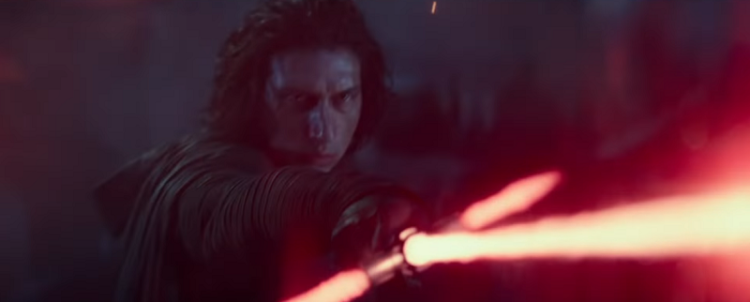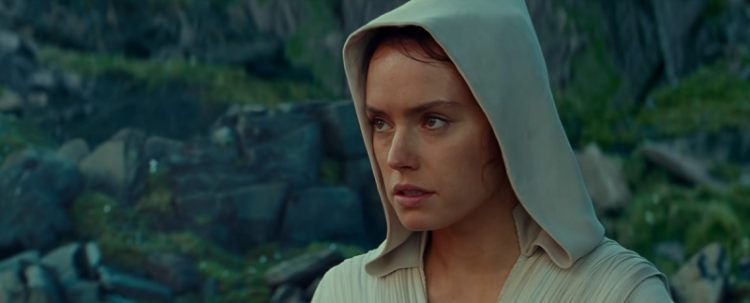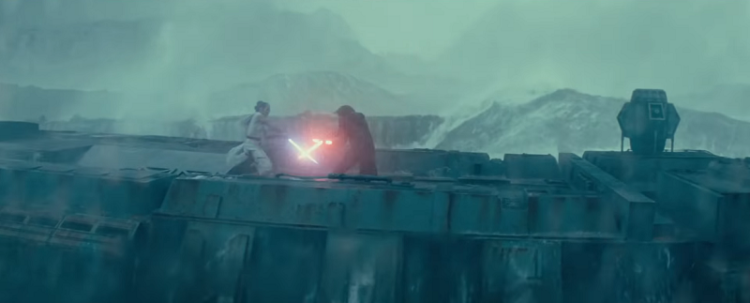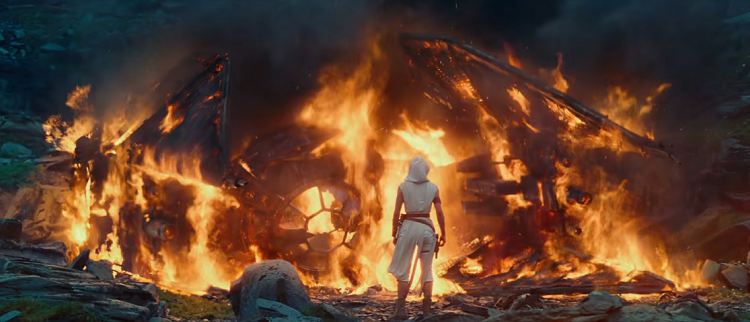I’ll get this out of the way early: I don’t think The Rise of Skywalker is a very good film. I am not arrogant enough to think that I can change anyone’s mind about a movie, especially a movie leaden with such importance for so many. But I hope that for those who are hurt, dismayed or even just plainly dissatisfied with The Rise of Skywalker, maybe there is still some small comfort to be found, something of value. As undeniably clumsy and compromised as the film is, there are nevertheless some rich ideas either openly at play or buried in the shuffle of a distracted and haphazard plot, ideas that are in conversation with the rest of the Skywalker saga and hearken back to its cinematic ancestry.
The two elements of the film’s climax and denouement that I want to look at are Ben’s sacrifice and Rey’s lineage. I believe these are wedded together inextricably — two families locked in alternating alliance and opposition throughout seventy-odd years of galactic history shifting through social and religious strata to polar extremes, and carrying the hopes and dreams as well as the horrors and crimes of the galaxy on their backs. In The Rise of Skywalker, there is a seismic collision that ultimately comes down to the choices of the characters rather than something predetermined — transforming both families, and indeed, what we thought mattered in Star Wars itself.

Don’t look back, before you go…
The parallels between Kylo Ren and his grandfather are numerous and of course, obvious — the narrative of his aspirations towards the mantle of Darth Vader are given a…confusing new context in The Rise of Skywalker with Palpatine freshly cast as the author of all that pain. Somehow. Casting aside the convoluted issue of Kylo’s motivations, history and influences, the film instead taps into something more vital, more fundamental to the narrative of the Skywalker saga: the relationship between the wayward son and his heartbroken mother.
The connections between fathers and sons are of course a key ingredient in the redemptions of both Anakin Skywalker and Ben Solo, but for a variety of reasons there is a lack of catharsis to certain elements of Anakin’s redemption with the expanded context of the prequels. The emotional crux of The Phantom Menace, and indeed the prequels, is Anakin leaving his mother. It drives the character from that point on in many ways, and his subsequent relationship with Padmé is more than a little maternal in its nature. By dint of production order, we are almost entirely disassociated from this by the time we get to Return of the Jedi; the relationship is just Luke and Anakin, with Leia sidelined and effectively (perhaps insultingly) turned into a bargaining chip between the two.
With The Rise of Skywalker, that missing catharsis comes into play in a variety of ways. Leia directly “intervenes” at the critical point, as her son grapples with the confusion and pain that his grandfather shared: an abject rejection from someone that he feels he is destined to be with. In this case it transcends the romantic and is in the very fabric of the Force. Shmi’s last instruction to her son as he walked away from her to become a Jedi was as follows: “Now. Be brave. And don’t look back. Don’t look back.” But this is quite literally what Ben does. And the pain that this action yields is quite literal as well — but he sees his mother again. And the pain, the confusion, it begins to disappear. Somehow…everything is alright. There is a reconnection with the maternal before he makes peace with his father’s memory. And as Leia dies in the temporal world she extraordinarily holds on to her physical form for a while, and for a specific reason.
And so, once Ben Solo is returned, once the specter of the Sith cult and their zombie Palpatine has been vanquished, he is presented with the scenario that plagued Anakin, that drove the Chosen One to evil: the person he loves the most, the person who is his very reason for being, someone whom he has caused much pain, lies dead before him. And as the ghosts of the past strengthened her against the forces of darkness, so too in another way do they call out from the past to him. It is not explicit in the film (again, its failings as a film are almost beside the point), but it is not much of a leap to cast your minds back to the emotionally devastated Anakin Skywalker at the Lars homestead, bemoaning the limits of his power and making a solemn oath on his mother’s grave to save the ones he loves from death itself. As Ben cradles the lifeless form of Rey we have a callback so typical of Star Wars movies, this time to the lifeless form of Shmi cradled in Anakin’s arms in the Tusken tent.
However, instead of fighting the pain and the horror of this tragedy and railing against the deep unfairness of this cruel fate, Ben makes a choice. He makes The Choice. And he finds what Anakin was looking for, eliding all the philosophies of the Jedi that have come before. He defies Palpatine’s declaration that “all those who gain power are afraid to lose it.” And he lets go…of himself. This is a different sacrifice from Anakin’s in this sense, and he cheats death of its victim. He fulfills the vow made on Shmi’s grave. This final act of the hereditary Skywalkers closes the loop and the pain with which they stepped on to the galactic stage. And as Ben surrenders his life to Rey, Leia and he become one with the Force together. And that little boy on Tatooine does look back, and he goes back to his mother. The gaping wound that started this entire family saga is healed. The circle is now complete.

There are things I cannot do…but there are certainly things I will do
The Star Wars saga’s ancestry in the works of Akira Kurosawa, most notably The Hidden Fortress, is well known. As are the allusions in the original film to one of Kurosawa’s major influences (if not the major influence), in John Ford — specifically The Searchers. A recurring trope in many of John Ford’s astonishing canon of movies is that they often culminate in a “good” lie, a fiction that one character concocts to spare another, or to keep the general peace. In some cases, such as The Long Gray Line, this warps into self-delusion, or an attachment to an ideal that is a mere specter of the past. In The Man Who Shot Liberty Valance, this tendency of Ford’s films — which had, by the sixties, infiltrated Hollywood filmmaking inexorably — was explored directly and is summed up in the iconic quote: “This is the West, sir. When the legend becomes fact, print the legend.”
Perhaps it is fitting that as the Skywalker saga comes to its conclusion, it reaches into its cinematic ancestry for inspiration. Having argued here the case for Rey to be truly nobody, I find it odd that I am compelled by the revelation of her true family, especially when it is conveyed in such a slap-dash manner and potentially raises more questions than it answers. The idea of being left with a Palpatine-by-blood as all the Skywalkers are wiped out is truly shocking, and on paper feels like an astonishingly dunderheaded, tone-deaf choice that might possibly fly in the face of what Star Wars has been about. However, looking at it in a broader context, not only of the saga but in terms of what happens in the film’s climax, there is something richer buried beneath the confused storytelling that I believe is of immense value and awards a strength and agency to Rey that is unprecedented in Star Wars. And it does so with a truly immense Fordian “good lie” to boot.
An important starting point with the revelation of Rey’s ancestry is that unlike Vader’s reveal to Luke, it does not turn Rey’s attitude and mindset on its head in the same way. Instead it validates an instinct she has had for most of the sequel trilogy: that she is not the hero, and that she is not the one to take up the sword against evil. The revelation is wielded by Kylo in much the same way that Vader chooses to deploy his own identity to Luke, but the outcomes are slightly different. In Luke’s case he chooses death rather than joining Vader — a choice that devastates the Dark Lord emotionally. In Rey’s case she takes the information and…does what she was going to do anyway, at least initially.
Rey is not looking to slay the dragon and be the hero. Unlike Luke she goes into the dark side cave unarmed; she does not draw her weapon against the mysteries that lurk within. She does not want the glory, which is why she deserves it when it comes to her. She has been forged by a hard life of self-reliance, of solitude and toil. She lived the Jedi ideal before she had even heard of the Force, and has arrived at her own conclusions on morality and justice. Nothing about her lineage can change this. Rey is not some sleeper agent, as her grandfather might expect, ready to pivot on a dime and embrace the evil that she is borne from.
And this is the point. This is the failure of the reawoken, Sith-amalgam Palpatine. Again the sequel trilogy concerns itself with flawed readings of the original trilogy — this time the villain has misunderstood Luke’s compassion for Vader, and Vader’s sacrifice, thinking that it is due purely to a blood relation, some hereditary connection that will triumph over all else. Rey does not work that way. Having had authorship over her own life, having been thrust onto the galactic stage and still holding to those ideals (even, remarkably, finding herself in a protracted argument with Luke Skywalker rather than being overawed by his reputation), she is not some pawn in a longform dejarik game. And she is not presented with her grandfather at the height of his powers, but rather a sickly corpse attached to a robot limb, a creature who has compromised with death and now performs for an audience of faceless cultists, more Mola Ram than the cunning Darth Sidious of old.
Rey overcomes her fears of what her dark lineage might betoken by holding onto her own, defined ideals, combined with that Jedi ideal of Master Skywalker. She elects to defend herself against Palpatine’s onslaught and let the evil consume itself with its own unlimited power. In this she embodies the true ideals of the Skywalker family, of Luke and Leia, by standing against an immense and unrepentantly dark force at the risk of losing her own life, but without the intent to meet the aggressor’s violence with equal violence. Again, like Ben, she denies Palpatine’s core, cynical precept of “all those who gain power are afraid to lose it”, and gives away her life in another selfless act.
More devastating to Palpatine, though, is the choice to erase his name. Once given the gift of life by the last of the Skywalkers, she chooses something greater than the facts with which to identify — even after a personal quest to uncover those facts, the one thing she had wanted more than anything. Instead she embodies a triumph of the truth. She casts off the name of a Galactic Emperor, and chooses the name of a slave: a “good lie” of major transformative power. She makes a pilgrimage to what could be the most mundane place in the galaxy, a moisture farm that fell afoul of the legions of her vile grandfather.
The most mundane, and maybe the most important. As it was the cradle of the Chosen One’s pain and the beginning of his path to the dark side, so too was it where another boy grew up and developed those values that would one day make him the greatest hero the galaxy had ever seen. And as Rey slides down the slope as she once did on Jakku, we might wonder if one day another generation will make a pilgrimage to an overturned AT-AT in another arid desert.

It will be a hard life…but you will find out who you are
If the original trilogy was a fairy tale, and the prequel trilogy a tragedy, then the sequels combine both to make a myth. We don’t get the naïve notion that simply blowing up the bad guys and throwing them down the well will solve everything this time. We don’t get a happily-ever-after, which would now feel strangely dishonest. How can you have happily-ever-after when so much of the saga has been about what happens to those who think their problems are behind them, who believe that they are in power, who know that they have all the answers? This evil is gone, but how can we say that evil is dead? Especially when we have destroyed it with force, with its own tools?
In his recent book Dominion, Tom Holland (not Spider-Man) quotes J.R.R. Tolkien on the last year of the European theater of World War II: ‘For we are attempting to conquer Sauron with the ring. And we shall (it seems) succeed. But the penalty is, as you will know, to breed new Saurons.” There is something faintly miserable about seeing Endor and Cloud City liberated…again. Of a First Order Star Destroyer hurtling towards the graveyards of Jakku, joining its ancestors to make fresh tombstones of yet another costly conflict. But that in some way is the point. That there may be no end to this. Somewhat amusingly in retrospect, The Last Jedi, despite having featured our heroes being whittled down to almost the barest minimum, ends on a note of more universal hope — that another generation might be inspired by defiance without violence. That they might live with real hope in their hearts, with dreams of making real change to the way they live.
Still, with The Rise of Skywalker we see some culmination of an idea in The Last Jedi: that the redemption of Darth Vader is misunderstood by the inhabitants of that Galaxy Far, Far Away. The sacrifices that Rey and Ben make are not of the vainglorious kind that Finn attempts on Crait, but rather are abdications of the awesome power that they might wield. And between the emotional and spiritual catharsis of Ben reuniting with his mother in the Force, and Rey Skywalker’s choice to identify both with him and with a higher ideal while erasing her imperial entitlement, we can find something more universal again, and hold to those better ways to fight evil and injustice without losing ourselves in the process. If that is the central message that the Skywalker saga has to impart to us, taken as a whole, then it should indeed be taken as that (deeply) imperfect whole. If we are open to engaging with it, then we will be richer for the experience one way or the other.


Part of me wonders if that scene between Han and Ben wouldn’t have been Leia and Ben if Carrie Fisher hadn’t died (of course, who knows if that arc of Leia dying would have played out like it did) – I think that would have sealed the mother-son counterpoint so well.
But this is a great article – thanks for writing.
I really enjoyed this. Thanks for engaging in such a thoughtful way.
Thanks for this analysis! The movie gave me a lot to chew on–not necessarily in the best way–but this has helped redirect my thoughts more positively, so thank you.